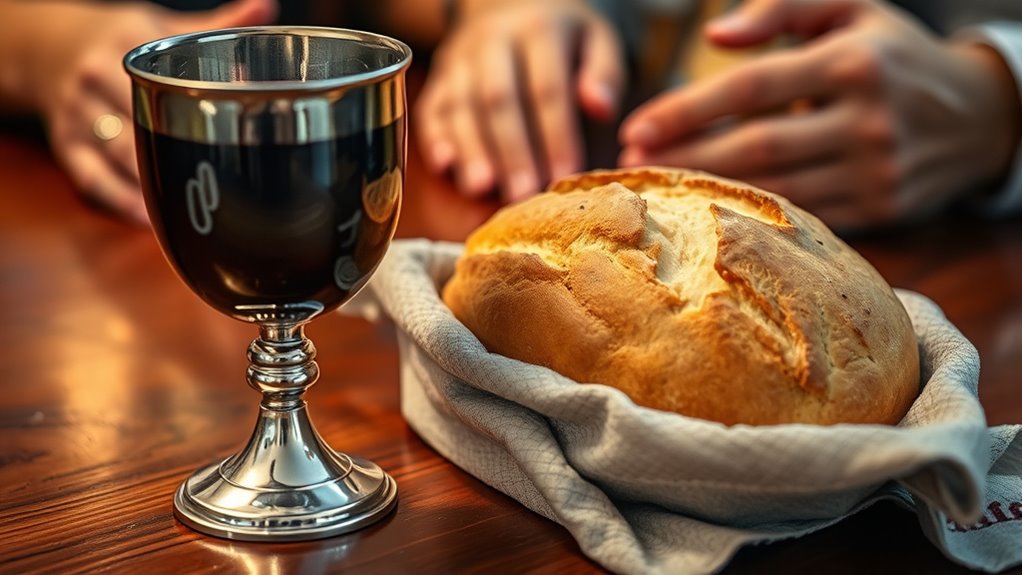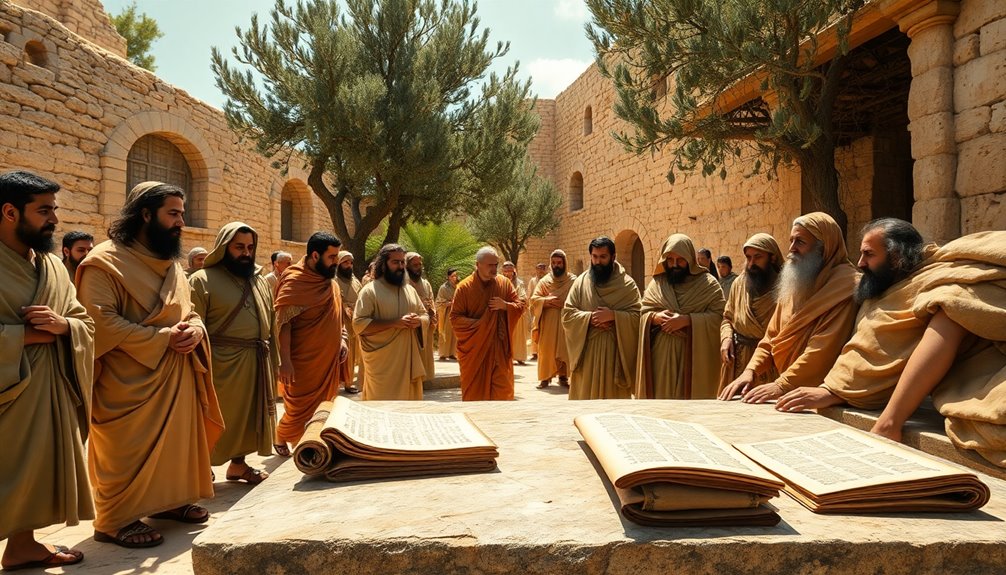Communion, or the Lord’s Supper, is a meaningful Christian practice that commemorates Jesus’ final meal with His disciples. It symbolizes His sacrifice through bread and wine, representing His body and blood. This act strengthens your connection with Christ and your faith community, offering reflection and renewal. Different traditions observe it in various ways, but its core purpose remains to remind you of divine love and salvation. To understand its deeper significance, keep exploring its rich history and spiritual meaning.
Key Takeaways
- Communion originates from Jesus’ Last Supper, establishing a new covenant symbolized by bread and wine.
- It serves as a spiritual remembrance of Christ’s sacrifice and a symbol of unity among believers.
- Different denominations vary in practice, emphasizing either symbolic meaning or transubstantiation.
- The ritual fosters personal reflection, spiritual renewal, and strengthens community bonds.
- Modern adaptations, including virtual participation, maintain its relevance and accessibility across cultures.
Origins and Biblical Foundations of Communion
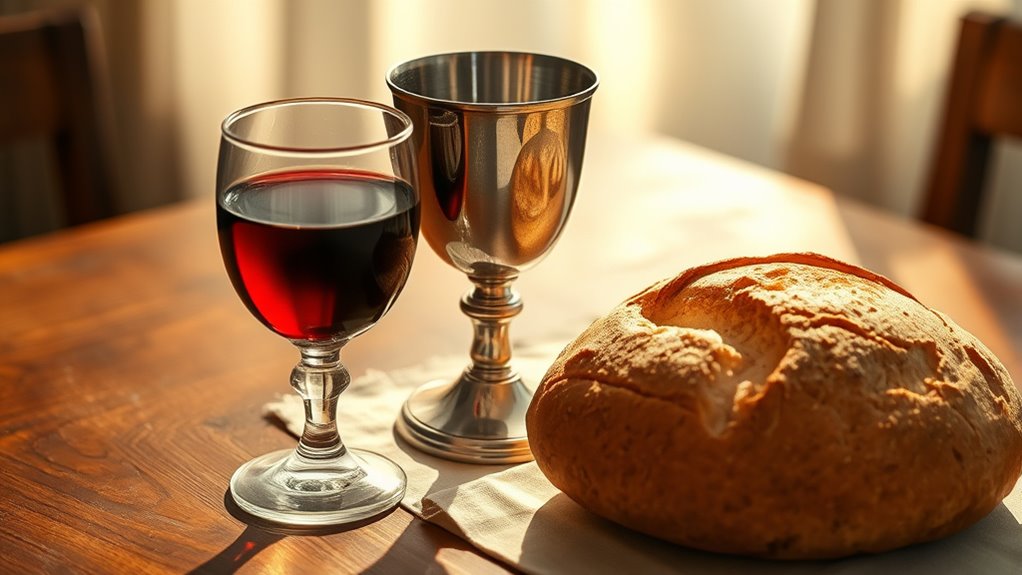
The origins of communion trace back to the biblical events of the Last Supper, where Jesus shared a final meal with His disciples. This moment lays the foundation for understanding its significance in Christian faith. Early church traditions quickly adopted the practice, emphasizing its role in community and spiritual unity. Over centuries, the historical development of communion evolved as different denominations interpreted its meaning and rituals. You can see how early followers of Christ continued this tradition, making it a central part of worship. The biblical accounts in the Gospels highlight Jesus’ instructions and the symbolism behind the act. These origins and biblical foundations firmly establish communion as a sacred act rooted in Jesus’ final moments with His disciples, shaping its importance throughout Christian history. Additionally, the Boho lifestyle emphasizes a connection to spiritual traditions and community, which resonates with the communal aspect of communion. Understanding the historical development of communion helps believers appreciate its enduring significance and diverse expressions in various Christian communities, including liturgical practices. The evolution of communion also reflects the influence of church theology, which has shaped its interpretation and rituals across different eras. Recognizing the cultural context of these practices further enriches the understanding of communion’s role in faith and tradition.
The Symbolism of Bread and Wine

Bread and wine carry deep symbolic meaning in the practice of communion, representing essential aspects of Christian faith. The bread symbolizes Jesus’ body, reminding you of His sacrifice and the gift of salvation. The wine signifies His blood, emphasizing the new covenant between God and believers. These elements hold significant ritual importance, serving as tangible signs of spiritual truths. When you partake, you’re not just eating and drinking; you’re connecting with the core message of Christ’s death and resurrection. The symbolism fosters reflection, unity, and reverence within the community. Their ritual significance lies in transforming simple elements into powerful symbols that reinforce your faith and the ongoing presence of Christ among His followers. This act deepens your understanding of God’s love and grace. Additionally, understanding the symbolism of bread and wine enhances your appreciation of their role in spiritual practice and the broader context of faith. Recognizing the expiration of spiritual significance can help believers appreciate the enduring nature of these symbols in their spiritual journey. These symbols serve as sacred reminders of divine truths that transcend time and cultural differences, strengthening your spiritual connection.
Jesus’ Institution of the Lord’s Supper
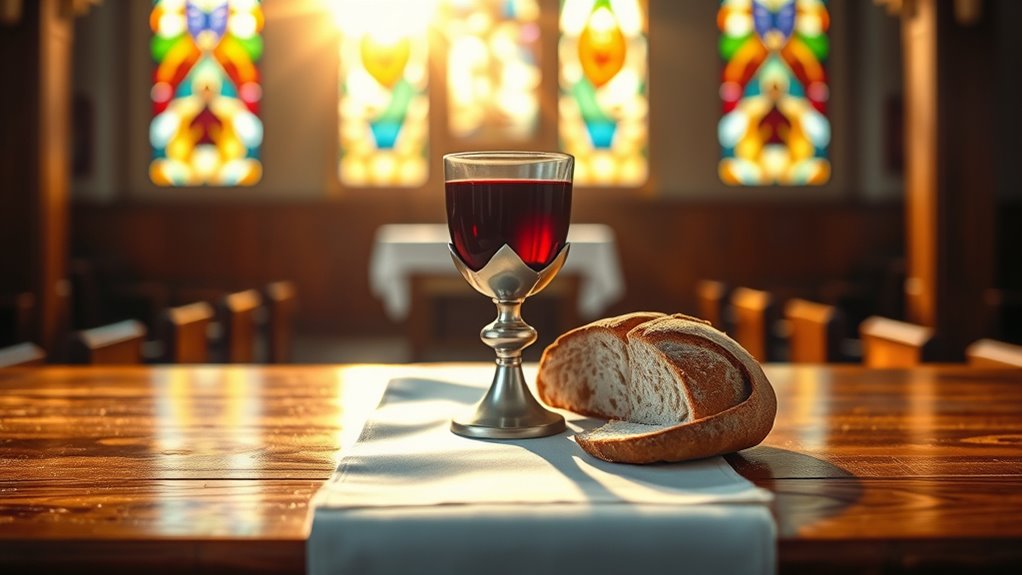
Have you ever wondered how the practice of the Lord’s Supper began? Jesus instituted it during the Passover meal, establishing a new covenant with His disciples. This moment marks the foundation of Eucharistic theology, where bread and wine symbolize His body and blood. In doing so, Jesus set a precedent that shapes liturgical traditions across Christianity.
Key aspects include:
- Jesus’ command to “do this in remembrance of me”
- The symbolic meaning behind bread and wine
- The significance of sharing a communal meal
Different Practices Across Christian Denominations
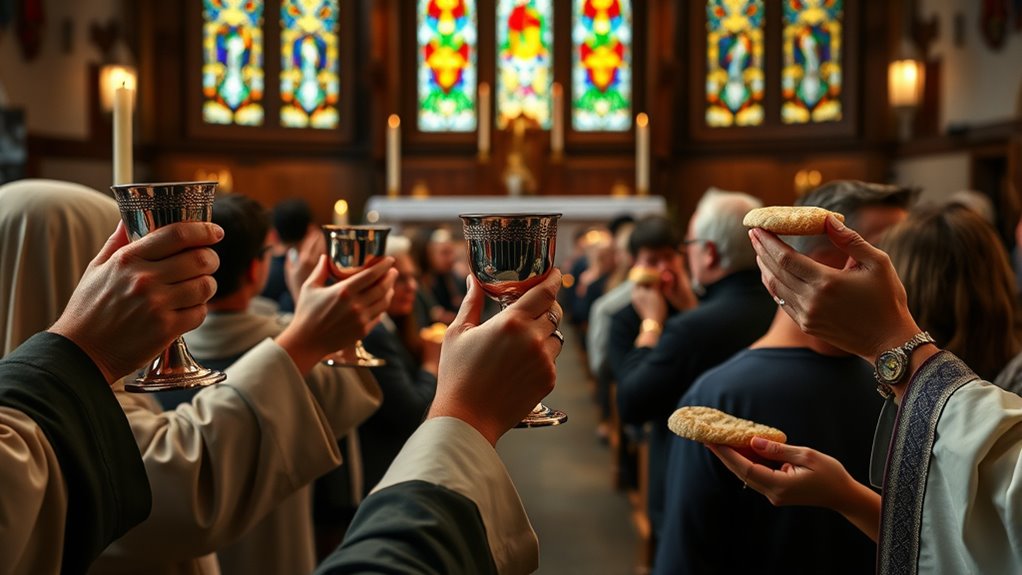
Different Christian denominations observe the Lord’s Supper in diverse ways, reflecting their unique theological beliefs and traditions. You’ll notice liturgical differences, such as the formality of ceremonies or the use of specific prayers and rituals. Some churches celebrate communion weekly, emphasizing its ongoing spiritual significance, while others observe it monthly or quarterly, viewing it as a special occasion. For example, Catholics often practice the Eucharist with a focus on transubstantiation, whereas many Protestant groups see it as symbolic. In Orthodox traditions, the liturgy is highly structured and deeply reverent. These variations in liturgical differences and communion frequency highlight each denomination’s understanding of the Lord’s Supper’s role, shaping how believers participate and connect with Christ’s sacrifice. Additionally, understanding the significance of faith practices can deepen appreciation for how these diverse traditions express their spiritual devotion. Recognizing the diverse practices helps believers appreciate the richness of Christian worship across different communities, emphasizing that the core intention is to foster spiritual renewal and a deeper connection with God. Moreover, the use of sacred symbols and ritual objects plays a significant role in enhancing the spiritual experience during communion in many denominations.
The Spiritual Significance and Personal Reflection

The spiritual significance of communion goes beyond mere ritual; it invites you to reflect deeply on your relationship with Christ and the sacrifice he made. As you partake, you’re encouraged to examine your heart, seek forgiveness, and renew your commitment. This moment fosters personal reflection, helping you recognize areas for spiritual growth. Additionally, contemplating the sustainable practices within the broader context of faith can inspire a deeper appreciation for creation and stewardship. Recognizing the historical roots of communion can deepen your understanding of its sacred origins and significance. Exploring the personality traits associated with spiritual practices can also enhance your connection during this sacred act. Engaging in spiritual principles during this sacred act can deepen your understanding of divine love and compassion. Reflecting on the exfoliation benefits of glycolic acid in skincare routines can serve as a metaphor for renewal and shedding old layers, aligning with the spiritual act of renewal. Engaging in this reflection allows you to grow spiritually, strengthening your connection with God. It’s a sacred opportunity to pause, evaluate, and renew your faith journey through honest self-examination.
The Community Aspect of Sharing Communion
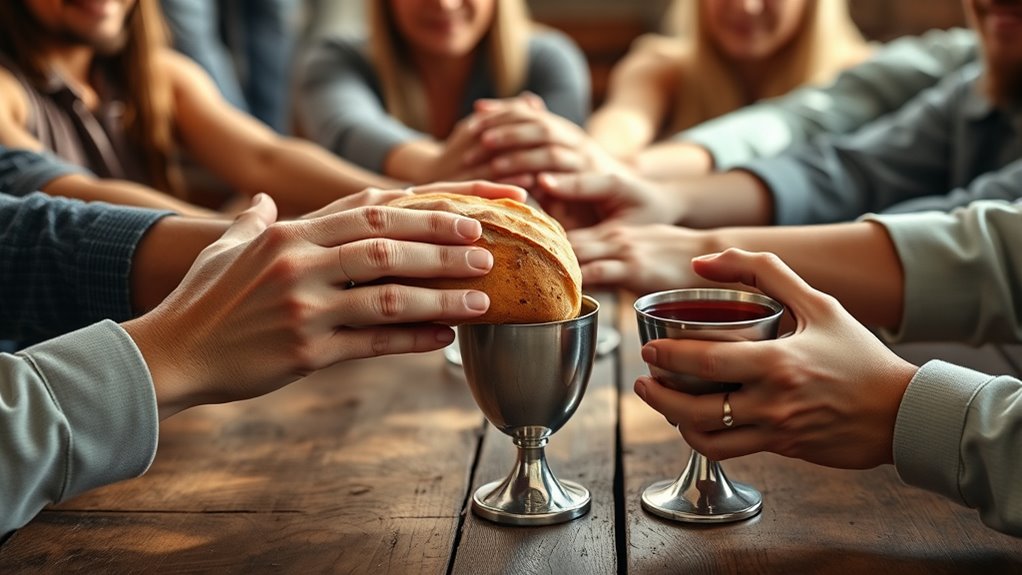
Sharing communion with others transforms a personal act into a powerful expression of community. When you participate with others, it emphasizes fellowship and reminds you that you’re part of a larger body. This unity deepens your connection with fellow believers, fostering a sense of belonging that extends beyond the individual. The act of sharing bread and wine symbolizes not only your relationship with Christ but also the bond you share with others in faith. It’s a collective reminder that you’re united in purpose and love. By engaging in communion together, you affirm that your spiritual journey is intertwined with the community around you, strengthening bonds and encouraging mutual support. The shared experience echoes the industrial and Victorian-inspired designs that often symbolize interconnected gears and mechanical parts, illustrating how individual elements work together to create a unified whole. Recognizing the community aspect of communion highlights how faith practices can serve as a foundation for building lasting relationships and mutual understanding among believers. This collective act can also serve as a spiritual renewal, renewing individuals’ faith and commitment within the community. Additionally, understanding the significance of this shared ritual can inspire greater appreciation for the symbolic meaning behind the elements used, such as bread and wine, which represent the body and blood of Christ. Furthermore, the concept of fellowship underscores the importance of shared spiritual experiences in strengthening faith and unity among members.
The Ongoing Relevance of the Sacrament Today
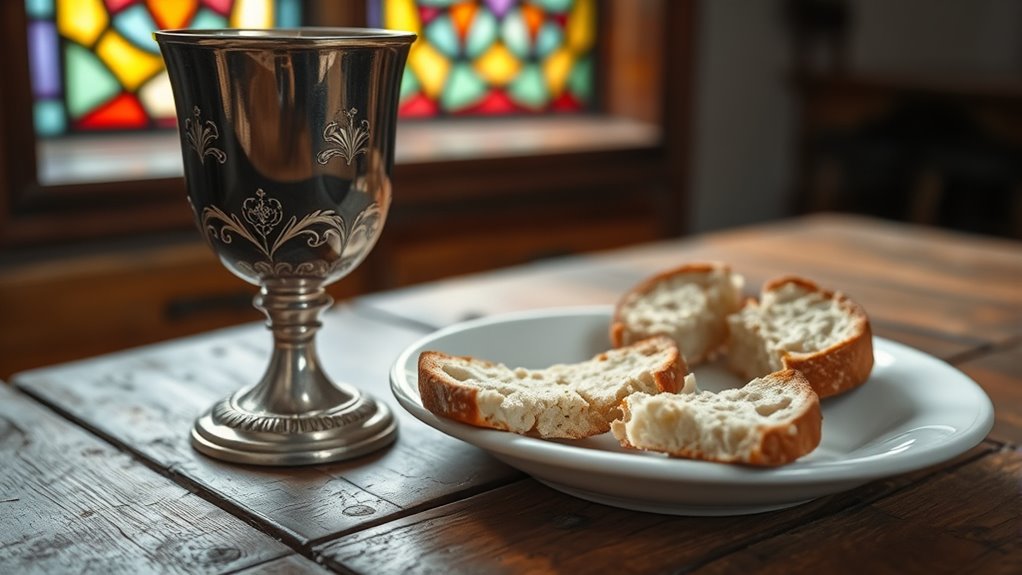
Despite the passage of time, the sacrament of communion remains deeply relevant today because it continually reinforces your connection to Christ and your faith community. Its significance transcends age, culture, and denominational differences, often viewed through diverse ecumenical perspectives. Modern adaptations have made it more accessible, allowing for meaningful participation regardless of location or circumstances. These adaptations include virtual celebrations and flexible formats that honor tradition while embracing change. The ongoing relevance of communion lies in its ability to:
Communion remains vital, strengthening faith and unity across cultures through adaptable, inclusive practices.
- Foster unity across different Christian traditions
- Serve as a personal reminder of Christ’s sacrifice
- Adapt to contemporary needs without losing its core meaning
- Cultivate digital accessibility by encouraging innovative ways to observe and reflect on its significance in varied contexts, ensuring that its spiritual impact endures in an increasingly connected world. Recognizing the importance of spiritual nourishment, many communities are integrating technology to facilitate ongoing engagement with the sacrament beyond traditional settings.
Frequently Asked Questions
How Often Should Christians Partake in Communion?
You’re wondering how often you should take communion. The frequency debate varies among churches, but many believe participating regularly enhances spiritual significance. Some do it weekly, others monthly or quarterly, aiming to keep their connection strong with Christ. Ultimately, it’s about your personal faith journey and what helps you grow spiritually. You should follow your church’s guidance and listen to your spiritual needs to decide the right frequency for you.
What Are the Common Controversies Surrounding the Lord’S Supper?
You might wonder about the controversies surrounding the Lord’s Supper, especially regarding whether it’s symbolic or literal. Different denominations have varying views: some see it as a symbolic remembrance, while others believe in Christ’s real presence. These differences often lead to debates about its significance, practice, and frequency. Understanding these perspectives helps you appreciate the diverse beliefs within Christianity and the importance placed on this sacred act.
Can Non-Christians Participate in Communion?
Imagine the communion as a sacred table representing unity with Christ. As a non-Christian, you might wonder if you can join. Typically, churches restrict interfaith participation to respect theological implications, emphasizing the Lord’s Supper as a sign of shared faith. Participating without belief can be seen as misunderstanding or disrespecting its spiritual significance, so it’s best to approach with reverence and seek guidance from your faith community.
What Role Does Communion Play in Church Unity?
You see, communion plays a essential role in church unity by fostering spiritual fellowship among believers. The Eucharist symbolism reminds you of Christ’s sacrifice, uniting your faith with others’. Participating together helps reinforce shared beliefs, deepen connections, and strengthen the church community. By engaging in this sacred act, you actively contribute to the bond that holds the church united in faith and purpose.
How Has the Practice of Communion Evolved Historically?
You might wonder how communion has evolved over time. Historically, practices varied widely, from simple shared bread and wine to elaborate ceremonies. Theological developments shaped its meaning, emphasizing different aspects like remembrance, unity, or grace. Over centuries, churches standardised rituals, but the core idea of communion as a spiritual connection remained constant. Understanding this evolution helps you appreciate its significance in faith communities today.
Conclusion
As you partake in communion, imagine the gentle swirl of wine and the broken bread, symbols connecting you to centuries of believers. Feel the unity as the community gathers around the table, each of you sharing in this sacred moment. This simple act becomes a powerful reminder of Christ’s love and sacrifice, a timeless bridge that keeps His presence alive in your heart. Through communion, you’re drawn closer to God and each other, reaffirming your faith’s enduring promise.

